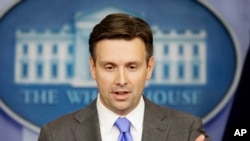WHITE HOUSE —
The United States says Afghanistan needs to approve and sign by the end of the year the Bilateral Security Agreement being considered by the assembly of Afghan tribal elders, or Loya Jirga, in Kabul.
Questions at Thursday's White House news briefing, and at the State Department, focused on remarks Afghan President Hamid Karzai made in Kabul as he presented the Bilateral Security Agreement to the Loya Jirga.
Karzai said he supports the agreement, but prefers it be signed after Afghanistan's presidential elections next April. He also told tribal leaders that he does not trust the United States, and U.S. officials do not trust him.
Deputy press secretary Josh Earnest said Karzai's remarks about trust do not themselves jeopardize the agreement, but failure to sign by the end of this year would create problems for post-2014 planning.
"The presence that is in Afghanistan right now is a NATO presence. So the United States needs to conduct some planning, both internally but also with our allies, to coordinate what our post-2014 presence will look like," said Earnest.
President Obama has not yet decided how many U.S. troops might remain in Afghanistan beyond 2014. As of early next year, only about 34,000 will still be in the country.
Earnest would not say whether a so-called zero option - of pulling all U.S. forces out of Afghanistan - is still possible. He said that no decision has been made.
Both the U.S.-Afghan Bilateral Security Agreement, and a Strategic Partnership Agreement signed in 2012 when Obama visited Kabul, envision a U.S. commitment to Afghanistan to at least 2024.
Both the White House and State Department have pushed back on the notion that a large troop presence would be needed for that length of time. Again, Josh Earnest.
"If there are troops in Afghanistan after January 1, 2015, what we're talking about is a number of troops on the order of a few thousand, so nothing like the scale of the military buildup that we have seen in earlier years, and we would anticipate that it would not require 10 years to complete that mission," he said.
In a letter, President Obama assured President Karzai that the U.S. military will not conduct raids on Afghan homes except under "extraordinary circumstances" involving urgent risks to U.S. nationals, and will respect Afghan sovereignty.
U.S. troops would have a narrowly defined role of continuing counterterrorism operations against what the administration calls remnants of al-Qaida, and continuing to train Afghan government forces to sustain their ability to shoulder security responsibilities.
Questions at Thursday's White House news briefing, and at the State Department, focused on remarks Afghan President Hamid Karzai made in Kabul as he presented the Bilateral Security Agreement to the Loya Jirga.
Karzai said he supports the agreement, but prefers it be signed after Afghanistan's presidential elections next April. He also told tribal leaders that he does not trust the United States, and U.S. officials do not trust him.
Deputy press secretary Josh Earnest said Karzai's remarks about trust do not themselves jeopardize the agreement, but failure to sign by the end of this year would create problems for post-2014 planning.
"The presence that is in Afghanistan right now is a NATO presence. So the United States needs to conduct some planning, both internally but also with our allies, to coordinate what our post-2014 presence will look like," said Earnest.
President Obama has not yet decided how many U.S. troops might remain in Afghanistan beyond 2014. As of early next year, only about 34,000 will still be in the country.
Earnest would not say whether a so-called zero option - of pulling all U.S. forces out of Afghanistan - is still possible. He said that no decision has been made.
Both the U.S.-Afghan Bilateral Security Agreement, and a Strategic Partnership Agreement signed in 2012 when Obama visited Kabul, envision a U.S. commitment to Afghanistan to at least 2024.
Both the White House and State Department have pushed back on the notion that a large troop presence would be needed for that length of time. Again, Josh Earnest.
"If there are troops in Afghanistan after January 1, 2015, what we're talking about is a number of troops on the order of a few thousand, so nothing like the scale of the military buildup that we have seen in earlier years, and we would anticipate that it would not require 10 years to complete that mission," he said.
In a letter, President Obama assured President Karzai that the U.S. military will not conduct raids on Afghan homes except under "extraordinary circumstances" involving urgent risks to U.S. nationals, and will respect Afghan sovereignty.
U.S. troops would have a narrowly defined role of continuing counterterrorism operations against what the administration calls remnants of al-Qaida, and continuing to train Afghan government forces to sustain their ability to shoulder security responsibilities.





